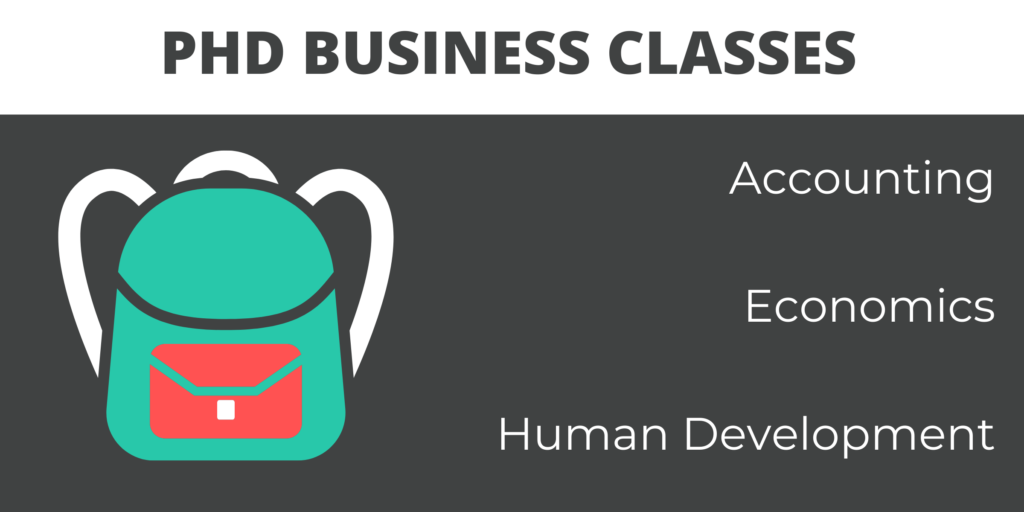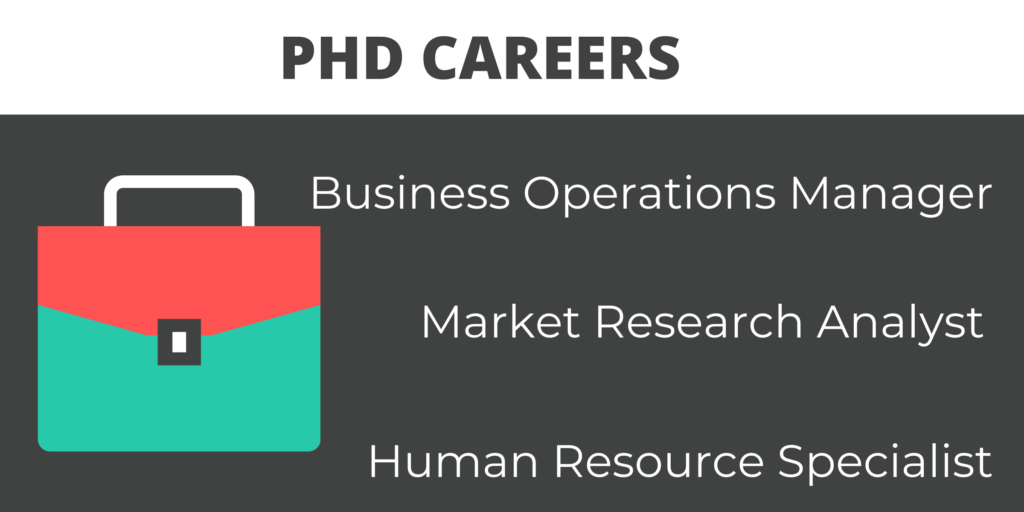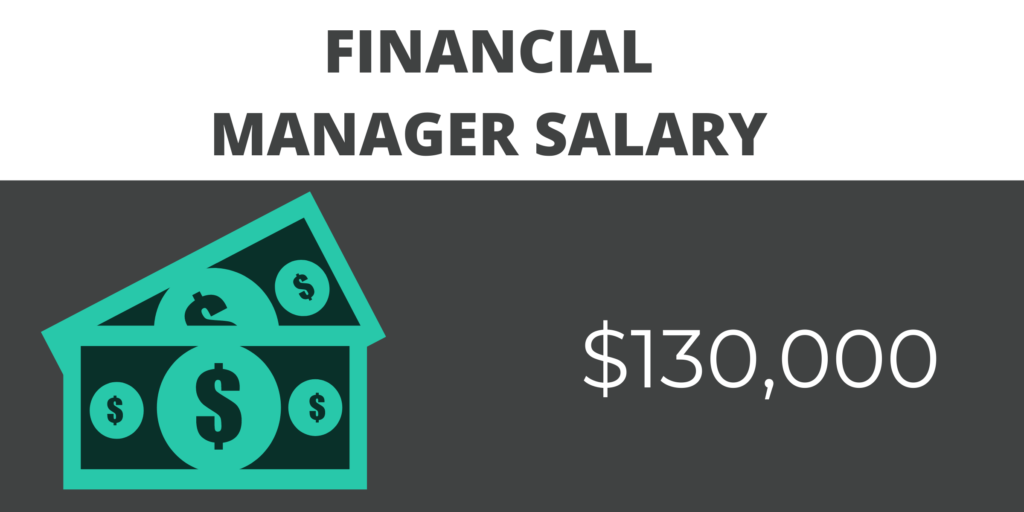
What is a Career in Business?
A career in business can manifest into many different occupations and responsibilities. For instance, business professionals interested in working with people and the social structures of business can build a career in human resources. On the other hand, business professionals interested in numbers and calculations can build a career in business analytics.
What this means is that a career in business is one of the most dynamic in the American economy, as it provides individuals with the flexibility to tailor their business work to match career goals and interests. Despite the diversity of jobs under the umbrella of business, the Bureau of Labor Statistics (BLS) reports that business-related jobs are growing at a faster rate than all other occupations in the job market.
The BLS does note however, that one of the trade-offs for the flexibility of business-related careers is that professionals often work more hours in daily averages. This will be unsurprising to many, as many careers in business come with responsibilities that do not obey a ‘9-5’ schedule. With that being said, some business careers are much more vulnerable to this scheduling problem than others. Those wishing to build a more stable and predictable schedule can certainly find opportunities with such specifications.
What is an Education in Business?

Because a career in business is so flexible and can lead into vastly different occupations, business degree programs manifest in likewise diversersity. Business degree programs exist at the following levels:
- Associate’s
- Bachelor’s
- Master’s
- Ph.D
- Professional Certification
Further adding options in educational paths is that many specialized degree programs outside of business offer business specializations as a program concentration. For instance, students can earn a computer science degree with a concentration in business administration, or a engineering degree with a concentration in business management. Almost every profession operates through the functioning of business and therefore a business-focus can be found in almost any educational path.
This is true all the way up to the Ph.D level degree program, though it is important to note that a business-focus might not be indicated in the name of the program or degree. Rather, a business focus can be achieved through independent research, thesis-work, etc.
To earn a Ph.D in a traditional business degree program requires tremendous commitment and planning. Many business doctorate candidates hold Associate’s, bachelor’s, and master’s degrees–an education representing 6 to 8 years before the time commitment to the doctoral program. By the time one graduates with a Ph.D of Business total time investment can reach 8 to 10 years of full-time education.
Top Considerations in Pursuing a PhD of Business

The time investment of pursuing a PhD of Business is only one part of the picture. Prospective students will need to consider the financial investment as well. Many students will need to plan for this expense long before enrollment, so consider the following breakdown of degree expenditures (averaged in-state and out-of-state and rounded for easy consideration).
- Associate of Business (2-4 years): $20,000 – $25,000
- Bachelor’s of Business (4 years): $40,000 – $50,000
- Master’s of Business (2 years): $40,000
- Doctorate of Business (2 years): $50,000
This equates to a total expenditure of around $200,000 over 8 to10 years in order to obtain a Phd of Business. It should be noted however, that students can pursue more affordable tuitions that are much lower than these averages. Similarly, students who earn an Associate’s of Business will mostly likely be able to transfer some credits to their Bachelor’s of Business program, which lower both the overall cost of time and money.
Prospective should also consider the return on investment (ROI) of each of these degrees. For instance, even with an Associate’s of Business students will have access to more employment opportunities than if they held no degree. What this means is that students can fund, at least partially, their business education by capitalizing on employment opportunities upon graduating from each program.

Modern degree programs are more accessible than ever before, so students should have no trouble finding a degree program that can be completed amidst full-time employment. While doing so might mean progressing through degree programs at part-time pace, students will be building valuable professional experience while earning their degree.
Part-Time vs. Full-Time, Online vs. On-Campus

In order to make the most of a business degree program, one must decide on an end-goal and the best approach to this goal. For many students, arriving at a good answer will mean answering the following 7 questions:
- Do you learn best on your own or when micromanaged?
One of the most differentiating elements of a degree in business is the size of the program. Students who want the attention and direction of the professor will want to pursue a degree program with a smaller class size–where course instructors will have more resources to dedicate to each student. Students who prefer to move at their own pace and learn on their own terms will find no problem thriving in larger classrooms and online programs.
- Will you need to earn an Associate’s degree before a Bachelor’s?
Students will need to pursue an Associate of Business before a Bachelor’s for a number of reasons. One is that many of the best Bachelor’s of Business programs require a high school academic record that excludes many prospective students. Another reason to pursue an Associate of Business before a Bachelor’s is if you need to seek employment as quickly as possible. An Associate of Business is the most efficient inroad into a business career, and can set up students to hold business occupations while continuing their education.
- Will you need to maintain employment throughout your degree program?
Financial situations will vary for each student and given the immense investment involved in earning a PhD, many students will need to work throughout their studies. This is important to decide early so that you can choose degree programs that afford the flexibility to do so. Many online programs are designed specifically to accommodate working professionals.
- Are you wanting to pursue a specialized area of business?
Some business degree programs are more specialized than others and thus require a more focused education and background. This specialization can be earned through research projects, working in the job market, or through choosing a degree program with the desired concentration.
- Which is more valuable to you in your chosen area–knowledge through education, or knowledge through experience?
Given one’s desired area of focus, students will need to decide whether they wish to build such specialization in a degree program or through working in the job market. Students who wish to build specialization in the job market can prioritize graduating as quickly as possible, and will want to consider accelerated degree programs. Students however, who will primarily build specialization in degree programs will want to structure plans around getting the most out of these programs.
- Do you have a PhD of Business in mind?
Given the stringent requirements for success in a PhD of Business program, students will need to begin building the necessary background as early as possible. Students who are able to demonstrate a focus and specialization from the time of their Associate’s or Bachelor’s program will be an ideal candidate for a business doctorate.
This will also help shape career decisions leading up to this point. For instance, if a student wishes to earn a PhD of Business Management, it would be ideal to build professional experience working as a manager.
- What are the most common career paths for those with that PhD?
To take one’s preparation to the next level, prospective PhD students should investigate the resulting career paths of graduates of their targeted PhD program. What industry do the graduates work in? What employers offer the graduates jobs? Then see if you can establish demands of the job market and employment opportunities. Tailoring your PhD education in the context of these considerations will set students up for successful business careers.
Is a PhD Degree Necessary for Entrepreneurship?

Given that entrepreneurship is the endeavor of creating, managing, and exchanging businesses, one might think that a PhD of Business would be ideal for succeeding as an entrepreneur. But this is not necessarily true. Unless one earns a PhD of Business that is specifically designed for entrepreneurs, a doctorate program will not necessarily prepare students for the demanding responsibilities of entrepreneurship.
Here’s why:
- The entrepreneurial path of one businessperson will differ entirely from that of another.
- Thus the skills needed to succeed in entrepreneurship depends entirely on the skills and knowledge required by one’s specific path.
- Whereas doctoral business programs are usually highly focused and specialized.
- While the skills learned in a doctorate of business program will certainly help one in entrepreneurship, it is likely not sufficient preparation in and of itself.
This is not to say however, that a PhD of Business will not contribute to success in entrepreneurship. Entrepreneurial efforts are primarily collaborative efforts, and a professional with a PhD of Business can offer tremendous value to projects from his/her specialized knowledge and expertise.
Even if a student decides to enroll in a PhD of Business program that is not distinctly committed to entrepreneurial education, students can pursue research projects and other opportunities for professional development in entrepreneurship. The point being, students will need to decide whether entrepreneurship will be a primary focus of their PhD studies, or if it will be the focus of independent study.
Ph.D in Business and Small Business

Small business is a subcategory of entrepreneurship which is much more focused on small business operations that usually function within a local/regional capacity. This means that the scope of small business is much more securely positioned within the range of specialty provided by most PhD of Business programs.
Some programs however, demonstrate more value to small business than others. For instance, if students wish to take over a small family business or wish to start one of their own, a PhD of Business Administration will be most conducive to associated tasks and responsibilities. If students wish to grow a family business or wish to take on a more specialized role in starting their own, a PhD of Business Marketing or Business Development would be excellent choices.
If students wish to specialize entirely in small business, there are a number of PhD programs designed with this in mind called PhD of Small Business Management, or Small Business Administration. These programs are designed to prepare students to master the process of creating, running, and optimizing small business operations.
These PhD programs are not only meant for individuals who have connections to existing or future small businesses, but also for those who wish to work with consulting firms or business development agencies.
Fastest Growing Job-Sectors of Business
Given the above suggestions for students to establish career goals as early as possible, it is important to establish industry-interests which will likely influence career decisions. There are two major areas of economic activity that will be of most interest to students who earn a PhD of Business.
Firstly, there are the highest performing sectors of the American economy–the industries that demonstrate the strongest metrics of profit and growth, and secondly, there are the areas of most growth and opportunity within the job market for business professionals. Noticeably, these two areas of growth and opportunity do not always align.
This is likely due to the fact that business professionals are often in high-demand in industries which need them most, such as areas of industry which are not currently demonstrating tremendous growth.
Fastest Growing Industries in the American Economy in 2020
(By Revenue Growth by IbisWorld)
- Online Groceries ——————————————————-74.5%
- Cough and Cold Medicine Manufacturing OTC ————— 68.8%
- 3D Printing and Rapid Prototyping Services ——————- 28.8%
- Online Pet Food and Pet Supply Sales ————————– 28.5%
- Hydraulic Fracturing Services ————————————– 27.8%
- High Frequency Trading ——————————————— 27.4%
- Autonomous Underwater Vehicle Manufacturing ————– 26.7%
- Stock and Commodity Exchanges in the US ——————- 26.3%
- Medical / Recreational Marijuana Growing ———————- 25.2%
- Video Streaming Services ——————————————- 24.0%
Business students will likely notice that the above list clearly demonstrates the economic shifts resulting from the COVID-19 pandemic. Whether in a state where lockdowns are enforced or not, consumers are staying home more than ever. The surges in delivery services and home entertainment are clear indications of this. While these areas of growth are subject to change as the economy adapts to COVID-19, business students will find tremendous opportunity in these sectors in the meantime.
Fastest Growing American Job Sectors
(By Growth in Wages, Salaries, and Employment by Bureau of Labor Statistics)
PhD business students will want to consider specializing in one of the following industries. These sectors are demonstrating explosive growth and will require business administrators, managers, marketers, business analytics professionals, etc. Below is an exploration of how business professionals are employed in each sector.
- Forestry (37%)
Forestry organizations must manage budgets, seek funding, and run marketing campaigns much like many other businesses.
- Individual and Family Services (34%)
Coaching, consulting, and therapeutic services rely heavily on business administration, human resources, and logistic professionals.
- Mining – Support Services (28%)
As technological capacities increase, so does the number and scale of manufacturing operations for creating these tools. Logistics, sales, and marketing professionals are positioned at the center of this industry.
- Outpatient Healthcare and Social Assistance Centers (26%)
Healthcare and social assistance that focuses on outpatient services relies heavily on management professionals that direct daily operations, and on human resources departments to train and recruit staff.
- Professional and Business Services – Computer Systems Design (23%)
IT professionals typically are not educated in business, and as such these professionals usually provide their services within the context of a full-functioning business.
- Grantmaking and Giving Services and Social Advocacy Organizations (22%)
Advocacy groups and charity organizations rely extensively on marketing campaigns and public engagement. Marketing, promotions, and business development professionals will find this to be a thriving market.
- Management, Scientific, and Technical Consulting Services (20%)
Management, administration, and business services consulting is becoming a huge market of employment for specialized business professionals. Business PhD candidates will want to consider specializing in consulting services.
- Software Publishing (19%)
The selling, licensing, and trading of software is a multibillion dollar business. Sales professionals will find this an ideal market to put their skills to use.
- Animal Food Manufacturing (16%)
Pets are becoming big business. As consumers spend more and more on pet food, business professionals lead the charge in the development and marketing of new brands. Similarly, pet food manufacturing companies employ sales representatives to negotiate and maintain contracts and agreements.
- Commercial and Industrial Machinery Maintenance and Repair (14%)
Commercial and industrial machinery is utilized by countless industries. As we develop new machines for different purposes, there is an increased demand both for sales executives to represent them as well as logistic managers who direct repairmen and maintenance teams.
In-Demand Business Professions (By Projected Job Growth)
These professions are in high-demand right now across numerous industries. What they have in common is an indication of the growing need for business professionals in areas of IT and healthcare. Where demand is high professionals have more freedom to pursue jobs that they find most appealing.
- Business Operations Managers
Incoming Jobs: 165,000
- Market Research Analysts
Incoming Jobs: 140,000
- Management Analysts
Incoming Jobs: 120,000
- Financial Managers
Incoming Jobs: 105,000
- Accountant
Incoming Jobs: 90,000
- Medical and Healthcare Services Manager
Incoming Jobs: 70,000
- Human Resources Specialist
Incoming Jobs: 30,000
6 Most Lucrative Jobs in Business
Now that we’ve covered some of the most promising industries and sectors of the job market. Let’s look at some of the most promising business careers, specifically at the most lucrative jobs for business specialists. Many of these positions will require either an established work history of success in business, or at least a specialized master’s degree in business–where a PhD is most helpful.
- Financial Manager
Earnings w/ PhD – $130,000
Financial Managers are specialized professionals who specialize in the financial operations of an organization. They monitor the financials the way a doctor monitors the vitals of a patient. Financial managers oversee teams of analysts and other business professionals to carry out daily tasks to collect data on an organization’s financial dynamics, analyze data to glean information, and put this information to use in a plan for financial optimization.
- Information Systems Manager / IT Manager
Earnings w/ PhD – $120,000
IT Managers employ specialized knowledge of business and information technology to oversee teams of IT professionals to direct daily operations to complete projects and hit organizational benchmarks. IT Managers will earn significantly more as they build specialization in more demanding software and database architecture.
- Management Analyst
Earnings w/ PhD – $112,000
Management Analysts are specialists who are masters of managing business operations. These professionals narrow their professional focus to testing, measuring, and reporting on metrics for success or failure in business management. These professionals are often employed as consultants or might find more competitive opportunities at large international corporations.
- Supply Chain Manager
Earnings w/ PhD – $106,000
These professionals are masters of logistics and oversee the multifaceted exchange and transport of goods through national and even international supply chain pipelines. Supply Chain Managers employ a command of logistic technology as well as the managerial skill needed to manager large teams of logistics professionals and to direct transport teams.
- Business Operations Manager
Earnings w/ PhD – $100,000
Where analysts study management techniques, business operations managers take on the role of manager within a specific organization or project. These managers specialize in directing large teams of multidisciplinary professionals to bring projects to life and see them through to success. Operations managers earn increasingly competitive salaries as they demonstrate success in overseeing various operations.
- Marketing and Sales Manager
Earnings w/ PhD – $90,000
Marketing and Sales Managers specialize in seeing the promotional and sales operations of an organization. These professionals typically oversee teams of marketers, sales reps, and even other managers depending on the size of the organization. A PhD is an excellent way to break into this position as a recent graduate of a business program.
Carrie Morris
Author
Warren Dahl
Editor-in-Chief
